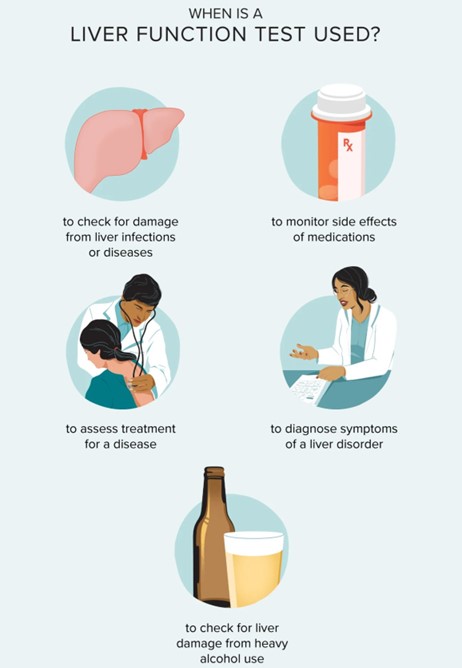A nurse is caring for a patient who has prostate cancer and is receiving combination chemotherapy with docetaxel and prednisone. The nurse should instruct the patient to report which of the following adverse effects that indicate peripheral neuropathy? (Select all that apply.)
Numbness, tingling, or pain in the extremities
Hearing loss, tinnitus, or vertigo
Constipation, urinary retention, or abdominal distension
Blurred vision, photophobia, or eye irritation
Muscle weakness, ataxia, or seizures
Correct Answer : A,E
Nursing Test Bank
Naxlex Comprehensive Predictor Exams
Related Questions
Correct Answer is A
Explanation
Choice A reason:
Liver function tests should be monitored for adverse effects of imatinib, as this drug can cause hepatotoxicity and liver failure in some patients³⁴. These are serious side effects that can affect the liver's ability to metabolize drugs and toxins.
Choice B reason:
Serum electrolytes are not directly affected by imatinib, as this drug does not cause significant changes in sodium, potassium, calcium, or magnesium levels³. However, electrolyte imbalances may occur due to other factors such as dehydration, diarrhea, vomiting, or kidney problems.
Choice C reason:
Coagulation studies are not directly affected by imatinib, as this drug does not cause significant changes in prothrombin time, partial thromboplastin time, or international normalized ratio³. However, bleeding disorders may occur due to other factors such as thrombocytopenia, anemia, or vascular damage.
Choice D reason:
Liver function tests are the only laboratory tests that should be monitored for adverse effects of imatinib, as this drug can cause serious liver damage in some patients. The other tests are not directly affected by imatinib, but may be influenced by other factors or conditions. The nurse should also monitor for other signs and symptoms such as nausea, vomiting, diarrhea, rash, edema, fatigue, infection, etc. The nurse should report any abnormal findings to the doctor and intervene as needed.

Correct Answer is D
Explanation
Choice D reason:
These are manifestations of neurotoxicity from vincristine, which is a chemotherapy drug that belongs to the vinca alkaloids. Vinca alkaloids work by binding to tubulin and inhibiting the formation of microtubules, which are essential for cell division and function. Neurotoxicity is one of the most common and doselimiting adverse effects of vincristine, which can affect up to 80% of patients. Neurotoxicity can manifest as peripheral neuropathy, which is the damage to the nerves in the hands and feet, causing numbness, tingling, burning, or pain. The nurse should monitor the client for peripheral neuropathy and provide pain relief and supportive care as needed³.
Choice A reason:
These are not manifestations of neurotoxicity from vincristine, but rather of paralytic ileus from vincristine. Paralytic ileus is the loss of intestinal motility, causing constipation, urinary retention, and abdominal distension. Paralytic ileus is another common adverse effect of vincristine, which can affect up to 40% of patients. Paralytic ileus is caused by the inhibition of microtubules in the smooth muscle cells of the intestine and bladder, leading to reduced peristalsis and urine flow. The nurse should monitor the client for paralytic ileus and provide laxatives, catheterization, and fluids as ordered⁴.
Choice B reason:
These are not manifestations of neurotoxicity from vincristine, but rather of ototoxicity from cisplatin, which is another chemotherapy drug that is used in combination with vincristine and prednisone for lymphoma. Ototoxicity is the damage to the inner ear or hearing nerve, causing hearing loss, tinnitus, and vertigo. Ototoxicity is one of the most serious and doselimiting adverse effects of cisplatin, which can affect up to 50% of patients. Ototoxicity is caused by the accumulation of cisplatin in the cochlea and vestibular system, leading to oxidative stress and cell death. The nurse should monitor the client for ototoxicity and provide hearing tests and vestibular rehabilitation as needed .
Choice C reason:
These are not manifestations of neurotoxicity from vincristine, but rather of ocular toxicity from rituximab, which is another chemotherapy drug that is used in combination with vincristine and prednisone for lymphoma. Ocular toxicity is the damage to the eyes or vision, causing blurred vision, photophobia, and eye irritation. Ocular toxicity is a rare but serious adverse effect of rituximab, which can affect up to 1% of patients. Ocular toxicity is caused by the infusionrelated reactions or immunemediated reactions induced by rituximab, leading to inflammation and edema in the eyes. The nurse should monitor the client for ocular toxicity and provide eye drops and steroids as ordered .
Whether you are a student looking to ace your exams or a practicing nurse seeking to enhance your expertise , our nursing education contents will empower you with the confidence and competence to make a difference in the lives of patients and become a respected leader in the healthcare field.
Visit Naxlex, invest in your future and unlock endless possibilities with our unparalleled nursing education contents today
Report Wrong Answer on the Current Question
Do you disagree with the answer? If yes, what is your expected answer? Explain.
Kindly be descriptive with the issue you are facing.
